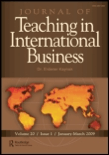
Journal of Teaching in International Business
Scope & Guideline
Innovating teaching strategies for international success.
Introduction
Aims and Scopes
- Innovative Pedagogical Approaches:
The journal explores new and effective teaching methodologies aimed at enhancing the learning experience in international business, focusing on practical applications and the integration of technology. - Experiential Learning in International Contexts:
It emphasizes the role of experiential learning, including study abroad programs and virtual teamwork, in developing students' global competencies and preparing them for international business challenges. - Cross-Cultural Competency Development:
The journal highlights the importance of fostering cross-cultural skills and global mindsets among students, crucial for navigating the complexities of international business. - Curriculum Development and Assessment:
It examines curriculum design and assessment strategies that align with the evolving demands of international business education, including the incorporation of sustainability goals. - International Collaboration and Networking:
The journal encourages collaboration between institutions and students from diverse geographical backgrounds to enhance learning and understanding of global business dynamics.
Trending and Emerging
- Virtual Learning and Digital Tools:
With the increase in remote education, there is a growing focus on the use of digital platforms and virtual learning environments to facilitate international collaboration and learning. - Sustainability and Global Citizenship:
Recent publications are increasingly addressing the intersection of international business education with sustainability goals and global citizenship, reflecting a broader societal emphasis on responsible business practices. - Intercultural Competence and Global Mindset:
There is an emerging trend towards developing intercultural competence and a global mindset among students, recognizing the importance of these skills in the global business landscape. - Experiential Learning Innovations:
Innovative approaches to experiential learning, such as virtual internships and cross-border team projects, are gaining prominence as effective methods for enhancing student engagement and practical skills. - Impact of COVID-19 on Education Practices:
The effects of the COVID-19 pandemic on teaching methodologies and curriculum design have become a focal point, leading to discussions on adaptability and resilience in international business education.
Declining or Waning
- Traditional Lecture-Based Teaching:
There is a noticeable decrease in publications focusing on traditional lecture-based teaching methods, as the emphasis shifts towards more interactive and experiential learning techniques. - Static International Business Models:
Research on rigid international business frameworks and models appears to be waning, as educators seek more flexible and adaptive approaches that cater to the global marketplace's complexities. - Single-Dimensional Cultural Studies:
The focus on single-dimensional cultural studies has diminished, giving way to more comprehensive and integrative approaches that consider multiple aspects of culture in international business education. - Textbook-Centric Teaching:
There is a reduced emphasis on traditional textbook-based teaching approaches, reflecting a broader trend towards innovative materials and digital resources that enhance learning outcomes. - Local Context-Specific Studies:
Research specifically tied to local contexts, without a broader international perspective, seems to be declining as the journal increasingly prioritizes global collaboration and comparative studies.
Similar Journals
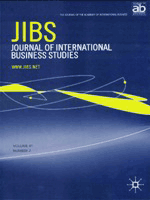
JOURNAL OF INTERNATIONAL BUSINESS STUDIES
Transforming Ideas into Global Business Strategies.JOURNAL OF INTERNATIONAL BUSINESS STUDIES, published by Palgrave Macmillan Ltd, stands as a premier platform for the exploration of contemporary issues in the realms of international business, management, and economics. With an impressive historical trajectory dating from 1975 and a projected convergence through 2024, this journal has established itself as a vital resource for academics and practitioners alike. It is categorized within the top quartile (Q1) across multiple disciplines, including Business and International Management, Economics and Econometrics, and Strategy and Management, reflecting its high-impact contributions to the field. The journal is recognized for its rigorous peer-reviewed articles, which foster an in-depth understanding of global market dynamics, strategic innovation, and operational excellence. Researchers, professionals, and students seeking to stay ahead in the fast-evolving landscape of international business will find rich insights and scholarly discourse in this esteemed publication.
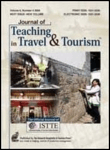
Journal of Teaching in Travel & Tourism
Empowering Educators in Travel and TourismJournal of Teaching in Travel & Tourism, published by Routledge Journals, Taylor & Francis Ltd, is a leading academic resource dedicated to the field of educational practices in the travel and tourism industry. Since its inception in 2001, this journal has aimed to bridge the gap between theoretical foundations and applied educational techniques, providing a platform for researchers, educators, and industry professionals to share innovative pedagogical approaches and case studies. With an impressive ranking in the 2023 quartiles, including Q2 in Education and Q3 in Tourism, Leisure and Hospitality Management, it reflects significant influence and relevance in its fields. Although it does not currently offer Open Access, the journal is committed to advancing knowledge through rigorous research articles, critical reviews, and instructional strategies that explore the evolving landscape of travel and tourism education. The journal's robust visibility on platforms like Scopus, ranking in the top 25% among Social Sciences and Education, underscores its importance as an indispensable resource for anyone invested in the academic study or practical application of travel and tourism pedagogy.
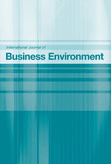
International Journal of Business Environment
Fostering Knowledge for Business ExcellenceInternational Journal of Business Environment is a distinguished academic journal dedicated to advancing knowledge and understanding of the dynamic business landscape. Published by InderScience Enterprises Ltd in the United Kingdom, this journal serves as a significant platform for researchers, professionals, and students in the fields of Business and International Management, Management of Technology and Innovation, and Strategy and Management. With a focus on contemporary challenges and innovations within the business environment, this journal welcomes high-quality empirical and theoretical contributions that strive to enhance strategic decision-making processes. Although the journal currently lies in the Q3 category across various management domains, it continues to evolve, aiming to influence and shape the future of business practices globally. The journal publishes biannually and is committed to providing a rigorous and fair peer-review process, ensuring that each publication meets the highest academic standards.

Ensayos-Revista de la Facultad de Educacion de Albacete
Inspiring collaboration among educators and researchers.Ensayos-Revista de la Facultad de Educacion de Albacete is a distinguished open-access journal dedicated to the field of education, published by UNIV CASTILLA-LA MANCHA, ESCUELA MAGISTERIO ALBACETE. Since its inception in 2011, the journal has provided a platform for high-quality research and innovative pedagogical practices, fostering academic discourse and collaboration among educators, researchers, and practitioners in the education sector. With an ISSN of 0214-4824 and E-ISSN 2171-9098, it is committed to disseminating knowledge that enhances educational outcomes and promotes effective teaching methodologies. The journal is located in Albacete, Spain, and emphasizes the importance of educational research in shaping contemporary educational frameworks. By ensuring open access to its content, Ensayos makes its research widely available, allowing for greater impact and engagement within the academic community. This commitment to accessibility positions the journal as a valuable resource for anyone invested in the advancement of education.

TEACHING SOCIOLOGY
Cultivating Critical Thinkers in Sociology Education.TEACHING SOCIOLOGY is a distinguished journal published by SAGE PUBLICATIONS INC, focusing on the pedagogical aspects of sociology and its related fields. With an ISSN of 0092-055X and an E-ISSN of 1939-862X, this journal caters to academics looking to enhance the teaching and learning experiences within sociology education. As evidenced by its impressive Q1 and Q2 rankings in Sociology and Political Science and Education, respectively, TEACHING SOCIOLOGY holds a notable position in the academic landscape, ranking in the top percentiles among its peers. This journal is particularly valuable for educators, researchers, and practitioners seeking to contribute to the advancement of teaching methodologies within the social sciences. Featuring a wide range of articles aimed at fostering innovative teaching strategies and scholarly discourse, TEACHING SOCIOLOGY is an essential resource for anyone dedicated to the cultivation of informed sociological inquiry. With its historical significance established since its inception in the late 1980s, the journal continues to impact contemporary educational practices in an ever-evolving academic environment.
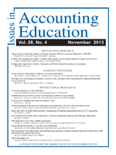
ISSUES IN ACCOUNTING EDUCATION
Shaping the Future of Accounting through ScholarshipISSUES IN ACCOUNTING EDUCATION is a leading academic journal published by the American Accounting Association, dedicated to advancing the field of accounting education through innovative research and practical applications. With an ISSN of 0739-3172 and an E-ISSN of 1558-7983, this journal has established itself as a key resource for accounting educators, researchers, and practitioners alike. Ranked in the Q2 category for Education and Q3 for Accounting in 2023, it plays a critical role in disseminating knowledge that enhances pedagogical practices and curriculum development across the globe. The journal is recognized for its robust contributions to the Social Sciences and Business Management fields, with Scopus rankings placing it in the 58th and 42nd percentiles, respectively. Although it does not offer open access, the journal is committed to fostering scholarly dialogue and contributing to the continuous development of accounting education from 2009 to 2024. Researchers, educators, and students will find invaluable insights and findings that not only shape academic discourse but also inform best practices in the classroom.
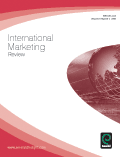
INTERNATIONAL MARKETING REVIEW
Advancing global marketing insights for over 40 years.INTERNATIONAL MARKETING REVIEW is a leading academic journal published by Emerald Group Publishing Ltd, showcasing cutting-edge research in the fields of Business and International Management, Economics and Econometrics, and Marketing. With an impressive Q1 ranking across these categories for 2023, this journal serves as a crucial platform for scholars and practitioners to disseminate innovative ideas and impactful research findings. Covering a wide range of topics from global market strategies to cultural influences in marketing, INTERNATIONAL MARKETING REVIEW is committed to advancing knowledge and understanding in international marketing practices. Although it does not currently operate under an Open Access model, the journal remains accessible to a global audience of researchers, professionals, and students dedicated to the evolving landscape of international business. As it converges into its fourth decade of publication, from 1983 to 2024, the journal continues to thrive, enriching the academic discourse and helping shape the future of marketing research.

Advanced Education
Exploring New Horizons in Educational MethodologiesAdvanced Education is a distinguished open-access journal dedicated to the interdisciplinary study of educational methodologies and innovations, published by the National Technical University of Ukraine - Kyiv Polytechnic Institute, Faculty of Linguistics. Since its inception in 2014, the journal has endeavored to disseminate high-quality research findings and theoretical work that contribute to advancements in educational practices and policy-making. With the increasing need for accessible education resources in our rapidly evolving global landscape, Advanced Education plays a critical role in bridging gaps between linguistic studies and educational technology, providing a platform for scholars, educators, and practitioners to share their insights. The journal aspires to enhance educational quality and effectiveness, making it an indispensable resource for researchers, professionals, and students engaged in the field of education.
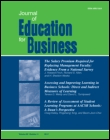
Journal of Education for Business
Empowering Educators, Elevating BusinessJournal of Education for Business, an esteemed publication within the fields of Business, Management, and Education, is published by Routledge Journals, Taylor & Francis Ltd. With an ISSN of 0883-2323 and an E-ISSN of 1940-3356, this journal provides a platform for innovative research that bridges the gap between business theory and educational practice. As a recognized leader in its domain, the journal holds a notable Q2 ranking in both the Business and Education categories for 2023, reflecting its impact and relevance in these competitive fields. The journal is indexed in Scopus with commendable rankings, making it a valuable resource for academics and practitioners aiming to enhance educational methods in business contexts. While it currently does not offer open access, the insights contained within its pages are crucial for anyone seeking to advance their understanding of the dynamic intersection between education and business. Engaging with the Journal of Education for Business not only contributes to scholarly discourse but also provides practical applications valuable to educators and industry professionals alike.
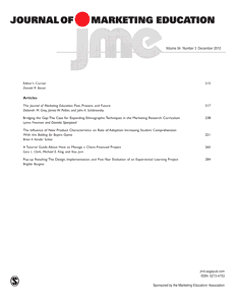
Journal of Marketing Education
Empowering Educators with Cutting-Edge InsightsThe Journal of Marketing Education, published by SAGE Publications Inc., is a premier academic journal dedicated to advancing the understanding and practice of marketing education. With an ISSN of 0273-4753 and an E-ISSN of 1552-6550, this journal has been a vital resource for scholars and practitioners since its inception in 1979. Reflecting its critical contribution to the field, the journal is ranked in the Q1 category in Education and Q2 in Marketing as of 2023, underscoring its impact and relevance. Notably, it holds impressive Scopus rankings, with a position of 197 out of 1543 in Education and 71 out of 210 in Marketing, placing it in the 87th and 66th percentiles respectively. While the journal is not open access, it remains accessible to qualified institutions and individuals, ensuring that the latest research and pedagogical practices in marketing education reach a dedicated audience. The journal's objectives include fostering scholarly discourse on effective marketing strategies, improving educational practices, and innovating curriculum development. By focusing on empirical studies, case analyses, and pedagogical innovations, The Journal of Marketing Education serves as a foundational platform for the next generation of marketing educators and researchers.